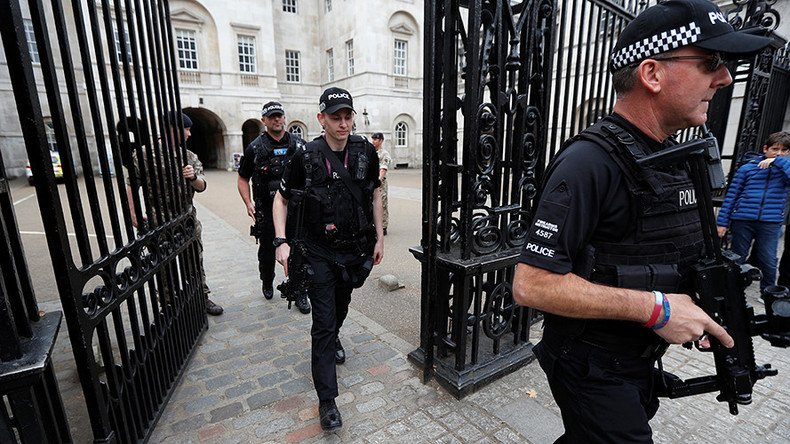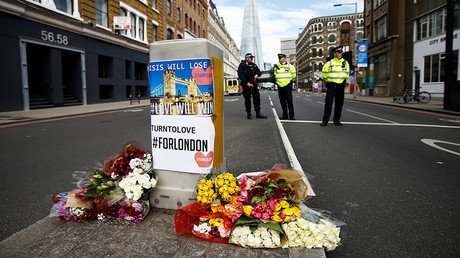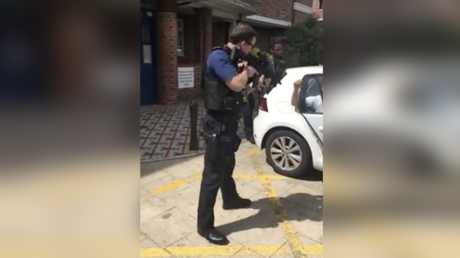Would arming all police officers make Britain any safer from terrorism?

Although the UK is often revered for being one of the few nations in the world where police maintain law and order without carrying guns as standard, the ongoing terrorism threat has reopened the debate on whether arming all officers would make Britain any safer.
In the wake of five terrorist attacks this year alone, police forces are again asking whether all officers should be routinely armed, not just specialist firearms units.
According to recent surveys, a majority of the public and a third of rank and file officers would back routine arming of British Bobbies.
But would arming all officers really make Britain any safer, or merely give the veneer of readiness?
David Videcette, a former Scotland Yard counterterrorism detective, debunked claims the routine arming of police could stop terrorist atrocities, telling RT it is a “total misconception.”
His comments come as a recent survey by the Police Federation revealed a significant number of officers are prepared to carry firearms in light of the heightened terrorism threat in the UK.
The federation, which represents 123,000 rank and file officers, found that contrary to longstanding opposition to being routinely armed, one in three officers are now prepared to carry arms on a regular basis.
The poll, which surveyed 32,300 officers, also found 55 percent of officers would be willing to carry a firearm if requested, up 11 percent on 2006 figures.
The police force in the UK is largely unarmed because it is founded on the principle of “policing by consent” rather than by force.
While police officers are routinely armed in Northern Ireland, most officers across the rest of the UK patrol unarmed, with guns only being carried by volunteers or highly-trained Authorized Firearms Officers (AFOs).
Videcette, who investigated the 7/7 London bombings that killed 52 people, said routine arming is actually counterproductive, because firearms can be snatched from officers and used against them, endangering the public.
It is a “risk not worth taking at the time being,” he said, especially as the perception of the terrorist threat is “much greater than it actually is.”
Of the 3,300 armed deployments carried out in 2016 by London’s Metropolitan Police, not a single bullet was fired against a suspect.
That is in stark contrast with US figures, where armed officers killed 1,092 people in 2016.
Metropolitan Police Commissioner Cressida Dick also voiced opposition to routine arming, as she said it would damage the force’s relations with the public.
“I understand why people are saying, ‘well, surely many more officers, or maybe even all officers, should be armed’ but I don’t actually agree,” she told LBC Radio.
“I don’t want to see every officer on every street corner carrying a gun.”
Responded to the survey, Deputy Chief Constable Simon Chesterman, the National Police Chiefs’ Council (NPCC) lead for armed policing, pointed out there are now 650 more armed police officers patrolling the streets of England and Wales since the Paris attack in 2015, which left 130 people dead, bringing the number of armed police to 6,278 out of a total of 125,851 officers.
The level of armed policing, however, will be further reviewed in light of the terrorism threat, with the findings of an NPCC study due in October.
“Chiefs remain committed to our model of policing with the principle of minimal use of force and a routinely unarmed service at its core,” Chesterman said.
“At the same time, they want to be assured we can end a terror attack quickly and protect as many people as possible.”
The survey also found that police from outside the capital who have a shorter supply of guns fear they may struggle to get armed officers to the scene of an attack. Up to 56 percent of respondents said they do not think armed squads would make it in time if needed.
The Association of Police and Crime Commissioners’ (APCC) lead on use of force, Martyn Underhill, said an “uplift” will be considered against a backdrop of an increased terror threat and criminality.
“We recognize that in recent times, policing has found itself operating within a rapidly evolving landscape.
“From the challenges posed by terrorism to the increase in reported knife crime, threats to public safety are constantly emerging and resources remain stretched.
“Against this backdrop, the debate on how to best equip officers has been brought to the fore, with forces nationally examining uplifts in firearms and Taser provision.”














